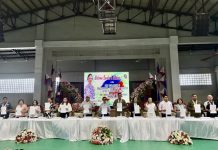TACLOBAN CITY – The city government wants to see all temporary shelters in this city vacant by October with the plan to transfer the remaining 339 families from makeshift houses to permanent housing units.
City housing and community development office head Maria Lagman said these families should be moved to their permanent houses with the onset of rainy season and availability of thousands of substantially completed permanent shelter.
“If we will transfer these families, there would be no additional effort on the part of the city government since we have been delivering (drinking) water there over the past years,” Lagman said, referring to the relocation sites located in the northern part of the city.
Families who totally lost their houses due to supertyphoon “Yolanda” devastation were relocated at the northern part of Tacloban.
Only temporary houses at the Cali transitional shelter site in Barangay Cabalawan will be spared from demolition since shelters there were built on higher grounds, and sturdier and the lot is owned by the city government.
“The plan is to convert the Cali shelters into evacuation centers,” Lagman added.
The city has 10 temporary shelter sites in five villages. Some of the properties are owned by the local government with the rest privately owned.
The 339 families will join the more than 2,000 households now in permanent shelters constructed by the National Housing Authority (NHA) in the northern part of the city for Yolanda survivors living in danger zones.
The city government is reluctant to bring more families from coastal communities to relocation sites due mainly to lack of water supply.
The local government has been delivering 80 tons or 21,521 gallons of water daily to resettlement sites since they were relocated.
Water supply has been tagged as the major setback to government’s effort to relocate more than 14,000 families to their new homes.
As of this month, only 2,036 houses of the estimated 5,000 completed units have been occupied.
Of the 2,036 houses, 1,028 were funded by the NHA and 1,008 by non-government organizations.
Most of them were transferred last April. Due to water supply problem, only less than 200 families from danger zones were moved to resettlement sites between April to September this year.
The national government earlier approved the proposed P152 million for long-term water system, which will take several years to complete.
“DBM agreed to release P90 million for the medium term solution so we could start the project using underground sources. We cannot transfer people without water,” Lagman said.
The city government is eyeing to relocate additional 3,000 families once the medium-term water supply project is completed. The target date is early next year. (SARWELL Q. MENIANO)



